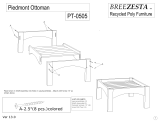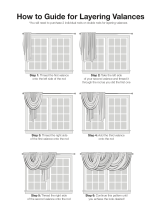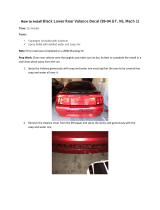
Assembly Instructions
Truss-Style Cinefold Portable Projection Screen by Draper
Truss Assembly
① Remove pouch containing viewing surface from case and set aside.
Remove all aluminum assemblies.
② Unfold all folded aluminum assemblies completely, noting labels and
color-coded marks. Lock all hinges. Position Stage Right and Stage Left
sections in appropriate positions with snaps facing up. Top and Bottom
sections should be set with snaps facing down.
③ To increase frame rigidity, hinges on top and bottom frame sections have
rivnuts marked with red and green. Insert a Handy Crank through the
threadless rivnut (red) and tighten into the threaded rivnut (green).
④ Apply small sections marked “Stiffener Bars” to back of Bottom frame
section, using eight Handy Cranks each. Failure to use all Handy Cranks
may result in damage to screen frame. Turn Bottom frame section over so
snaps face up.
⑤ If your screen frame is less than 25' wide, repeat step 4 for Top frame sec-
tion. Frames 25' wide and over are equipped with a special full-width Stiff-
ener for the top frame section. To attach it, place Stiffener fl at with green
rivnuts face down. Place top frame section on top of and at right angles
to Stiffener, over the green rivnuts. Insert and tighten standard Handy
Cranks. Install 45° angle braces to the Top frame section and Stiffener with
short Handy Cranks. Turn Top frame so snaps face up.
Dress-Up Kit Assembly
PLEASE NOTE: All components are labeled and color coded to
facilitate assembly.
A. Valance Bar attaches to frame with simple bayonet-style mounting.
B. Draper Bars mount to Valance Bar, bayonet-style.
C. Optional adjustable Skirt Bar is secured to frame at desired level with
positive-locking plunger mechanism. If Skirt Bar is not used, Skirt may
be snapped to bottom of viewing surface.
D. Valance, Drapes, and Skirt snap onto Mounting Bars.
E. Gaps between the frame and the valance can be easily removed by
pulling the bottom edge of the valance to close the gap.
F. Pulling and smoothing the edges of the panels will remove any
wrinkles or puckers that might be present when product is unfolded.
Drapery
Bar
Valance Bar
Drapery
Bar
Adjustable Skirt Bar
Rigid
Truss
Frame
Anti-Sway
Stabilizers
Heavy-Duty
Legs
Frame & Legs
Assemble with
Handy Cranks
⑥ Join Top and Bottom to Stage Right and Stage Left, using two Handy
Cranks on each of the four corners. Match numbers on white labels, and
keep in mind that no Handy Crank should protrude outside screen frame.
⑦ Remove surface from pouch. With the row of male snaps at bottom, posi-
tion screen surface over frame. Snap each of the four corners, then snap
across bottom, up sides, and across top.
⑧ Attach feet to inner side of legs with Handy Cranks, matching color-coded
markings. Attach legs to Stage Right and Stage Left with Handy Cranks,
matching colored tapes.
⑨ Raise screen to a vertical position. Add Heavy-Duty Legs and Anti-Sway
Stabilizers with Handy Cranks in the positions indicated below.
Copyright © 2010 Draper Inc. Form Cinefold_Inst11 Printed in U.S.A.
®
Caution: Make sure all hinges and joints are locked
before raising screen to standing position.
Caution:
Make sure
screen is placed
on level surface.
Caution: Beware
of pinch points.
Caution
① Read instructions through completely before proceeding; retain for future
reference.
② Handle viewing surface with care; do not allow it to come in contact with
sharp or dirty objects.
③ Use Handy Cranks provided; failure to do so may lead to screen damage.
④ Make sure screen is level.
⑤ Do not write on viewing surface.
⑥ The ideal temperature range for assembling folding screens to prevent
damaging the surface is 68°-78° F (20°-26° C). Assembling below
recommended temperatures may damage surface and void warranty.
A Note About Surfaces
① Always fold with snaps face-to-face. Do not permit screen fabric to
contact border material or snaps when folded. Store in pouch
provided.
② Take care at all times not to permit Cinefold viewing surface to contact any
dusty or dirty area, nor any varnished or painted object.
③ When necessary, clean Cinefold viewing surface with mild soap and water.
USE NO SOLVENTS! Surface must be completely dry before folding.





